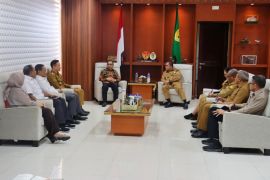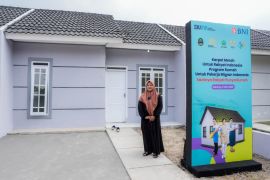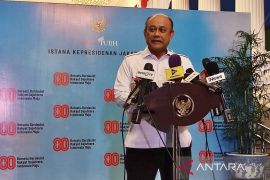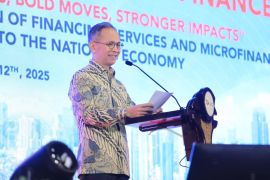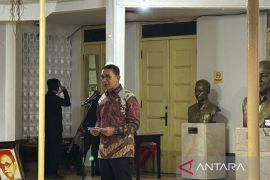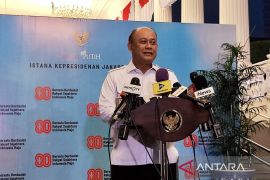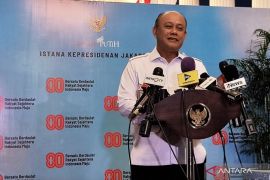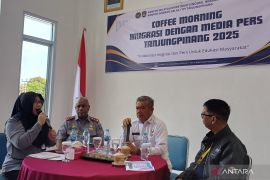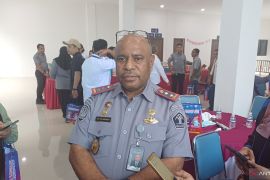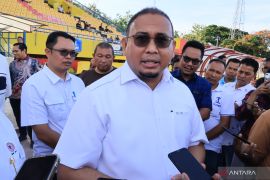President Jokowi said as a consequence of the acceleration in the infrastructure development, the government needs more expansive fiscal policy resulting in bigger budget deficit.Jakarta (ANTARA News) - The government has allowed the deficit to widen in the 2016 draft state budget for the sake of its ambitious infrastructure program.
President Joko Widodo (Jokowi) proposed a draft state budget to the parliament on Saturday with a deficit of 2.1 percent of the Gross Domestic Product (GDP).
In 2015, the state budget deficit target was set at 1.9 percent of the GDP with state spending set at Rp1,984.6 trillion as against state income of Rp1,761.6 trillion.
The president said the policy in spending is concentrated on increasing productivity, increasing the role of the private sector and state companies and regional administration in accelerating infrastructure development.
He said as a consequence of the acceleration in the infrastructure development, the government needs more expansive fiscal policy resulting in bigger budget deficit.
"In order to sustain the fiscal policy, the deficit would be covered with funds from sources including foreign sources," he said.
Foreign financing would be selective with no strings attached and low cost of fund, he said.
The domestic income target is set at Rp1,848.1 trillion including Rp1,565.8 trillion in tax revenues, Rp280.3 trillion in non-tax revenues and Rp2 trillion in grant.
The spending target is set at Rp2,121.3 trillion including Rp1,339.1 trillion for the central government and Rp782.2 trillion in fund to be transferred to the region and rural fund.
The deficit would be covered with Rp272 trillion fund from domestic sources and Rp1.2 trillion in foreign loans.
The government sets aside a budget of Rp313.5 trillion for infrastructure development or 8 percent of the total state expenditures.
The target for infrastructure budget is larger than the target of Rp290.3 trillion set in 2015. The fund would be used to build new roads, including toll roads, bridges, airports and seaports.
The infrastructure projects will also include pioneer airports to support area connectivity and create more equitable development.
Jokowi told the lawmakers that in line with his Nawacita program, the government will continue to accelerate development of infrastructure.
Trans Java toll road would be in operation to be followed with Trans Sumatra toll road.
"We are building toll roads that will soon operational to link the western and eastern ends of Java. In several years, a toll road will extend between the northern and southern tips of Sumatra," he said.
In addition, Kalimantan, Sulawesi and Papua will have their first railways, and more irrigation dams, ports and airports and shipyards would be built to support the sea toll project.
Sea toll is one of Jokowis long term projects to transform the country into a worlds maritime axis and to create more equitable economic welfare in the western and more backward eastern regions of the country.
Another ambitious project is to build more power plants with a total capacity of 35,000 megawatts until 2019 to put behind the inconvenience of shortage in power supply and frequent blackouts especially in the outer regions.
The president pledged to open more traditional markets and fiscal incentives for development of productive economic activities to boost development of the peoples economy.
The government would continue development of special economic zones and industrial estates especially outside Java to boost development of agriculture-based and mining based industries.
Jokowi also sought to draw attention to development of creative economy, which he said is potential to create new jobs for which mastery of sciences and technology would need to be improved.
He said Indonesia should no longer turn its back to the ocean, adding the seas and the oceans hold economic and defense potential as well as potential to maintain national integrity.
Our seas need to be saved from damage caused by climate change and marine resource need protection from looting including illegal fishing, he said.
"We have to remain firm in dealing with illegal fishing with order to sink fishing boats poaching in our seas. International law is against illegal fishing and looting of marine resource," he said.
Development of sea toll is an important maritime infrastructure that would include shipbuilding facilities.
The policy would sustain maritime economic development and sea conservation, the president said.
Indonesia has to be able to show to the world that it is a maritime country, set to effectively utilize the marine resources, he said.
"That it is an early step toward creating a worlds maritime axis. Maritime axis is not only designed to contribute to national defense but also to regional as well as global defense.
"That is the strategy being studied to be put in the National Maritime Policy," he said.
Meanwhile, Finance Minister Bambang Brodjonegoro said the Public Works and Housing Ministry is given the largest share of the fund in the proposed draft state budget.
"The Public Works and Housing Ministry had a budget of Rp103.8 trillion in 2016," Bambang said.
Other ministries given major shares of budget include the defense ministry with an allocation of Rp95.9 trillion, police department Rp67.2 trillion, health ministry Rp64.8 trillion, religious affairs ministry Rp58.5 trillion and transport ministry Rp50.2 trillion, education and culture ministry Rp49.2 trillion, finance ministry Rp40.5 trillion, research and technology and high education institute ministry Rp38 trillion and agriculture ministry Rp32.9 trillion.
The budget for infrastructure in the 2016 draft budget is set at Rp313.5 trillion, up from the target of Rp290.3 trillion in 2015.Role of Insurance Industry
The Indonesian Chamber of Commerce and Industry (Kadin) said insurance industry has not played sufficient role in the development of infrastructure in the country.
Deputy chairman of Kadin for banking and finance Rosan Roeslani said the countrys insurance industry has recorded rapid growth in the past several years.
The industry has been successful in collecting long term public funds that the industry should be more potential to finance infrastructure projects.
"The insurance industry should take advantage of the momentum of acceleration in infrastructure development. On the other hand, project owners should involve the insurance industry in financing their projects with less risk. They should be more aggressive," Rosan said.
Incentives should also be offered to owners of infrastructure projects using the service of national insurance industry that would create mutually beneficial strategic collaboration, he said.
"So far it has been difficult to get bank funding for infrastructure because of problem of mismatch in time. On the contrary insurance industry is in a position to provide long term source of fund," he said.
Based on data at the Financial Service Authority in 2015, almost all investments by insurance industry of Rp527.93 trillion were in bank deposit and securities.
The opportunity of business in financing infrastructure has been taken by foreign financial companies while Indonesian insurance firms are given only the role as sub-contractor.
He said infrastructure projects in 2015-2019 would need funding more than Rp5,500 trillion. Around 40 percent of the fund are expected from the state budget, 10 percent from budgets of regional administrations, 20 percent from state companies and the rest from the private sector.
Contribution from the insurance industry, therefore, is needed to cover the funding deficit for infrastructure projects, he said.
With Infrastructure Bank not yet making its appearance, the opportunity to take part in funding business is wide for the existing financial agencies.
"Third party funds in national banks by February were recorded at Rp4,150 trillion with Loan to Deposit Ratio (LDR) around 88.26 percent. With LDR at the level, banks would not risk long term funding for infrastructure projects," Rosan said.(*)
Reporter: Agus Salim
Editor: Heru Purwanto
Copyright © ANTARA 2015
